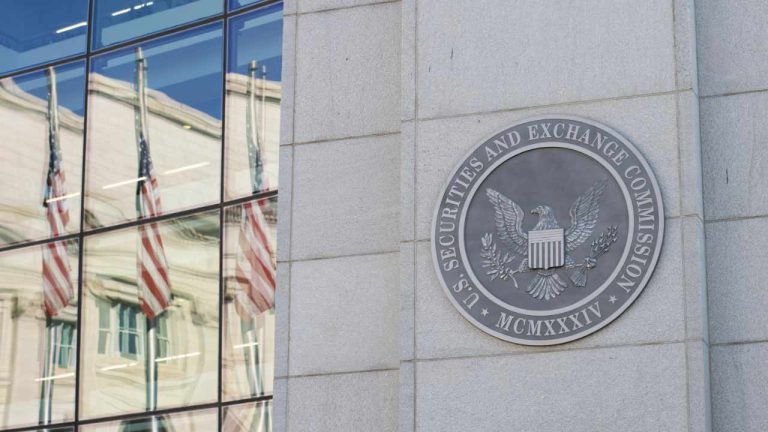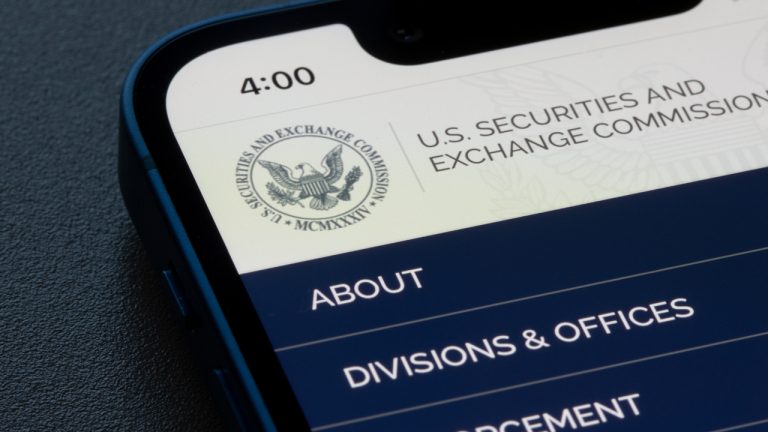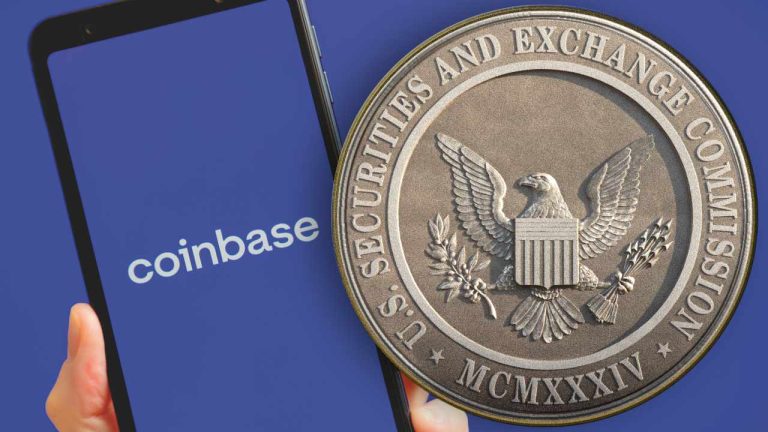 A lawyer has explained why the U.S. Securities and Exchange Commission (SEC) will likely lose if the regulator takes crypto exchange Coinbase to court over alleged securities law violations. “The problem is entirely of Gary Gensler’s own making,” he stressed. Lawyer Expects SEC to Lose Against Coinbase in Court Lawyer James Murphy explained in a […]
A lawyer has explained why the U.S. Securities and Exchange Commission (SEC) will likely lose if the regulator takes crypto exchange Coinbase to court over alleged securities law violations. “The problem is entirely of Gary Gensler’s own making,” he stressed. Lawyer Expects SEC to Lose Against Coinbase in Court Lawyer James Murphy explained in a […]
Coinbase CEO Brian Armstrong called the quarter a "turning point" for the company as it worked towards a more "financially disciplined" firm.
Crypto exchange Coinbase managed to significantly narrow its net loss in the first quarter of 2023, due in part to robust earnings from retail investor trading activity.
The company’s net loss fell from $557 million in Q4 2022 to $79 million in Q1, partly attributed to a 22% increase in revenue to $736 million.
The results beat expectations from some analysts, leading to a 7% spike in Coinbase’s (COIN) share price in after hours trading.

Transaction revenue — derived from fees its charges for trades — from its institutional base increased a whopping 66% to over $22.3 million, while transaction revenue from retail investors increased14.1% to $352.1 million, according to Coinbase’s May 4 shareholder letter.
Overall, revenue from transactions increased 16% quarter-on-quarter to $375 million, though trading volumes remained fairly flat.
Interest income and blockchain rewards from staking brought in the most revenue for the quarter, which increased to $240.8 million and $73.7 million respectively from Q4 2022.
The percentage of revenue from Bitcoin (BTC) (36%) and Ether (ETH) (18%) trades remained almost identical over the quarter.
The firm is inching closer to profitability following a tumultuous 2022 which saw overall net losses of $1.16 billion, $803 million, $576 million and $605 million across each respective quarter last year.
Coinbase explained that the quarter represented a “turning point” towards building a more “efficient” and “financially disciplined” firm:
“We reduced costs, doubled down on operational excellence and risk management, and continue to drive product innovation and regulatory clarity. Our efforts are showing meaningful progress.”
“Our teams are smaller, but more nimble than ever and we are pleased with the pace of innovation and the results we are seeing,” the firm added.
Coinbase cut staff by 18% in June, 2022 and then another 20% in January, 2023 in order to ensure the firm maintains an appropriate level of “operational efficiency,” Armstrong explained.
Related: Coinbase International Exchange launches amid SEC crypto crackdown in the US
Coinbase’s comments were made in light of the Wells Notice hanging over their heads from the United States Securities Exchange Commission (SEC):
"We see this as an opportunity to continue pushing for a clear rule book in the US for crypto regulations."
The firm said it is "heartened" to see more bi-partisan support for incoming crypto legislation and hopes to play a role in advocating for a rules-based industry.
Magazine: Crypto regulation — Does SEC Chair Gary Gensler have the final say?
 On April 27, Coinbase, the crypto exchange based in San Francisco, made public the disclosure of its response to the Wells notice it had received from the U.S. Securities and Exchange Commission (SEC) back in March. The company maintained that the regulatory body’s enforcement actions were in direct contrast to the agency’s previous approval of […]
On April 27, Coinbase, the crypto exchange based in San Francisco, made public the disclosure of its response to the Wells notice it had received from the U.S. Securities and Exchange Commission (SEC) back in March. The company maintained that the regulatory body’s enforcement actions were in direct contrast to the agency’s previous approval of […]
Palihapitiya did concede the crypto sector has “pushed more boundaries” than other startup sectors, which may have attracted the SEC’s attention.
Regulators in the United States have choked out the cryptocurrency sector to the point of death, according to Bitcoin (BTC) bull and billionaire tech investor Chamath Palihapitiya.
“Crypto is dead in America,” he boldly claimed in an April 22 episode of the All-In podcast.
Palihapitiya’s comment came in response to the news that cryptocurrency exchange Coinbase is now considering a move offshore. He pointed the finger at Gary Gensler, the chair of the U.S. Securities Exchange Commission:
“Crypto is dead in America. I mean now you have Gensler even blaming the banking crisis on crypto — so the United States authorities have firmly pointed their guns at crypto.”
While Palihapitiya said that the U.S. likely views crypto as a threat to its “establishment,” the tech investor did however attribute some fault to the sector:
“In fairness to the regulators, [the crypto sector] did push the boundaries more than any other sector of the startup economy.”
He rounded out his analysis by concluding that the good actors are now “paying the price” for the bad work done by FTX and other firms that have impacted the reputation of the industry.
“The bill has come due for them,” he added.
David Sacks, one of the show’s co-hosts, said the U.S. may be trying to choke out crypto because it may eat into the dominance of the U.S. dollar:
“I think it’s probably not a coincidence that you’re seeing all these concerns about de-dollarization at the same time they're cracking down on crypto.”
But the overall impact will be a net negative one, implied Sacks, who is of the view that pushing crypto companies offshore will be “terrible for American innovation.”
Related: Coinbase CEO on its Wells notice: SEC is like soccer referees in a game of pickleball
Other commentators have described the issue at hand as “Operation Choke Point 2.0” — an alleged orchestrated effort by regulators to discourage banks from holding crypto or providing services to crypto companies.
Palihapitiya was baffled by the notion that Coinbase — a digital asset trading platform that he says had “played by the rules, stood in line” and “tried to do the right things” — was no closer to receiving regulatory clarity than the now-bankrupt FTX.
“How is that even possible,” Palihapitiya asked. Sacks answered that former FTX CEO Sam Bankman-Fried “had skills in gaming the system.”
In March, the SEC issued Coinbase a Wells notice — which typically implies the regulator plans on pursuing legal action against the firm for potential violations of U.S. securities laws.
If a lawsuit is filed, Coinbase CEO Brian Armstrong says that the exchange will be ready to litigate.
Magazine: Unstablecoins: Depegging, bank runs and other risks loom
 After the report revealing that the cryptocurrency exchange Bittrex had received a Wells Notice from the U.S. Securities and Exchange Commission (SEC), the securities regulator charged Bittrex and the company’s CEO on April 17 for “operating an unregistered exchange, broker, and clearing agency.” Following the Wells Notice, SEC Charges Bittrex for Violating Federal Laws On […]
After the report revealing that the cryptocurrency exchange Bittrex had received a Wells Notice from the U.S. Securities and Exchange Commission (SEC), the securities regulator charged Bittrex and the company’s CEO on April 17 for “operating an unregistered exchange, broker, and clearing agency.” Following the Wells Notice, SEC Charges Bittrex for Violating Federal Laws On […] According to a recent report, the cryptocurrency exchange Bittrex received a Wells notice from the U.S. Securities and Exchange Commission (SEC) in March, signaling a potential lawsuit. The SEC’s enforcement division sent the Wells notice prior to Bittrex deciding to wind down its operations in the United States. ‘Lack of Regulatory Clarity’ in the U.S. […]
According to a recent report, the cryptocurrency exchange Bittrex received a Wells notice from the U.S. Securities and Exchange Commission (SEC) in March, signaling a potential lawsuit. The SEC’s enforcement division sent the Wells notice prior to Bittrex deciding to wind down its operations in the United States. ‘Lack of Regulatory Clarity’ in the U.S. […]
Bitcoin’s strong start to 2023 is persisting despite numerous headwinds, and is currently outperforming the S&P 500 Index by nearly 60 percentage points.
Following Bitcoin’s (BTC) stellar start to 2023, SkyBridge Capital founder Anthony Scaramucci believes “we’re through the bear market” and expressed confidence in his firm's crypto investments.
However, "the Mooch" qualified the statement by adding, “That is a guess. We don't know.”
In an April 6 interview with Yahoo Finance, Scaramucci noted that Bitcoin has consistently outperformed every other asset class over longer periods of time, saying:
“But any time that you've held Bitcoin in a four-year rolling interval, so you pick the day, hold it for four years, you've outperformed every other asset class.”
Scaramacci also expressed his bullish outlook for the leading crypto by market cap ahead of the next halving cycle, which is set to take place in early March 2024 according to NiceHash.

Bitcoin has historically operated on a four-year cycle, with the start of an upwards trend occurring soon after each halving cycle.
The theory behind the price cycle is that block rewards being halved makes the BTC in existence more scarce, and therefore more valuable.
Bitcoin has recorded gains of nearly 70% in 2023 according to Cointelegraph Pro, increasing from $16,521 to $28,060 compared to the S&P 500 index rising by just over 7% during the same time period.
Bitcoin’s enviable start to 2023 also comes amid what can only be described as poor market and regulatory conditions that may yet weigh down the price.
Crypto institutions based in the United States are struggling to find banking partners and liquidity following the collapse of crypto-friendly banks such as Silvergate, Silicon Valley, and Signature Bank and there are fears that the U.S. is putting into place a policy to prevent banks from interacting with crypto.
Related: Bitcoin ‘faces headwinds’ as US money supply drops most since 1950s
Additionally, the two largest crypto exchanges in the world according to CoinMarketCap — Binance and Coinbase — have both been subject to recent scrutiny from regulators.
Coinbase received a Wells Notice on March 22 notifying of possible enforcement action from the Securities and Exchange Commission, while Binance has been sued by the Commodity Futures Trading Commission after allegedly violating trading and derivatives rules
Yet, despite these events, crypto sentiment remains positive.
The Crypto Fear & Greed Index, an indicator used to measure crypto sentiment, is currently sitting in greed territory and is pushing for highs that haven’t been seen since November 2021 — Bitcoin's all time high.

Asia Express: Zhu Su’s exchange did $13.64 in volume akshually, Huobi in crisis

While the U.S. government opts for “regulation by enforcement,” other countries are fostering “vibrant” crypto ecosystems due to progressive regulation, argues Coinbase’s Daniel Seifert.
With Coinbase seemingly on the verge of a court battle with the Securities and Exchange Commission (SEC), the firm has emphasized that the U.S. government’s hawkish approach to crypto regulation has “left a vacuum that other countries are eager to fill.’
The SEC issued Coinbase a wells notice on March 22 outlining that SEC staff had recommended the agency take enforcement action over “possible violations of securities laws” concerning some of the firm’s asset listings, staking services and Coinbase Wallet.
In a March 23 blog post titled Europe is winning. Will the US catch up? Daniel Seifert, Coinbase’s Vice President and Regional Managing Director in Europe, stressed that the U.S.’s “regulatory approach to crypto has been marked by regulation by enforcement,” despite industry-wide calls for “comprehensive crypto regulation.”
“This approach has created an environment of uncertainty and instability in the crypto industry,” he wrote.
Coinbase’s top lawyer @iampaulgrewal says the SEC wants court fights instead of conversation.
— Laura Shin (@laurashin) March 24, 2023
In dozens of meetings with the SEC over the last 9 months, Grewal says the exchange was “given essentially no response” to key questions.
Listen:https://t.co/027slXaMhb pic.twitter.com/L0ikJwleyA
As such, Seifert argued that the U.S. is losing its status as the leading hub of the crypto sector, while France, the U.K. and the European Union, are now building “vibrant” ecosystems due to their friendlier approach to crypto regulation.
“The US has left a vacuum that other countries are eager to fill,” he wrote, adding: “we are proudly an American company. It’s hard to sit by and watch the US squander the opportunity it has been given.”
The SEC misses one of the biggest frauds in history - FTX/Alameda
— sassal.eth (@sassal0x) March 23, 2023
Gary Gensler cozies up to the head of that fraud - SBF
And then the SEC goes after the most legitimate company in crypto - Coinbase
Yes yes very normal and totally rational
In particular, Seifert highlighted the significance of the Blockchain Week event being hosted at the Louvre in Paris this month. He also pointed to the U.K.’s recent push to become a crypto hub, and the European Union’s Markets in Crypto-Assets (MiCA) regulation that is slated to come into effect in 2024.
“This year it’s being held in a private space at the Louvre, arguably the greatest national treasure in France and one of the world’s most respected museums,” he said, adding:
“To me this is a clear signal: France is rapidly recognizing the opportunity that crypto presents and is offering it space to flourish. The broader EU, the UK, UAE, Hong Kong, Singapore, Australia, and Japan are all following suit.”
The MiCA legislation has been in development for two years, and aims to establish a “harmonized set of rules for crypto-assets and related activities and services.”
Related: Cathie Wood’s ARK loading up on Coinbase shares again, buying $18M
It is generally expected to be a positive move for the European cryptocurrency ecosystem, as it will offer clear rules and guidelines for the sector.
“Already we are seeing that Europe now matches the US in its share of crypto developers ( 29% apiece globally). The US used to lead the charge with 40%,” he said, adding that:
“This level of growth does not happen by chance. Concerted efforts have to be made, such as developing a regulatory framework that will provide clarity and stability for businesses operating in the space.”
In a lengthy March 23 Twitter thread, the Crypto Council for Innovation also highlighted similar points to Seifert, noting that “crypto is global, and nobody is waiting around for the US to land the plane.”
1/ Crypto is global, and nobody is waiting around for the US to land the plane. Here, our roundup of global activity ():
— Crypto Council for Innovation (@crypto_council) March 24, 2023
The thread explored positive developments across the globe, including examples such as the National Australia Bank’s work with non-USD pegged stablecoins, Hong Kong’s efforts to become a digital asset hub, and the Canadian Securities Administration recently imposing "enhanced investor protection commitments" on domestic crypto exchanges.

ARK Invest purchased 269,928 shares in Coinbase on March 23, only two days after it sold $13.5 million, its first sale of Coinbase shares this year.
Cathie Wood’s investment management firm has gone back to buying Coinbase shares again, just a day after COIN’s stock price dipped amid news of its Wells notice.
On March 23, ARK Invest purchased 268,928 Coinbase shares via its ARKK Innovation and ARKW Next Generation Internet exchange-traded funds. The shares wereworth $17.88 million at the time of writing.
Only two days prior, and before the news of the Wells notice broke, ARK Invest sold 160,887 Coinbase shares from its ARK Fintech Innovation ETF. The sale was the first time any of ARK Invest’s ETFs shed Coinbase shares in 2023.
Cathie Wood and Ark Invest's trade activity from today 3/23 pic.twitter.com/yyubxTegZj
— Ark Invest Daily (@ArkkDaily) March 24, 2023
Coinbase’s share price has failed to recover since it shared news it had received a Wells notice warning of possible enforcement action from the Securities and Exchange Commission, which led to COIN shares dropping around 21%.
Shares in Coinbase dipped to a low of $64.27 after trading began on March 23, and at time of writing were trading at $66.87 in after-hours trading, according to Barron’s.

Related: Coinbase CEO on its Wells notice: SEC is like soccer referees in a game of pickleball
Coinbase CEO Brian Armstrong had also sold shares in his firm between March 17 to March 20 — just days prior to the Wells notice and share price dip.
SEC filings indicate, however, that Coinbase executives and insiders all enter into 10B5-1 selling plans months in advance and that this tranche of sales was pursuant to a trading plan adopted on Aug. 16.

While the SEC reached a settlement with crypto exchange Kraken on Feb. 9 after alleging its staking services qualified as securities, Coinbase has repeatedly asserted that its staking products are fundamentally different from Kraken’s and they cannot be universally labeled as securities.
Magazine: Best and worst countries for crypto taxes — Plus crypto tax tips
 The U.S. Securities and Exchange Commission (SEC) has sent Coinbase a “Wells notice” about potential violations of securities law. The Nasdaq-listed cryptocurrency exchange noted that, unlike what SEC Chairman Gary Gensler said, the securities regulator “will not let crypto companies ‘come in and register.'” Coinbase CEO Brian Armstrong explained: “A Wells notice typically precedes an […]
The U.S. Securities and Exchange Commission (SEC) has sent Coinbase a “Wells notice” about potential violations of securities law. The Nasdaq-listed cryptocurrency exchange noted that, unlike what SEC Chairman Gary Gensler said, the securities regulator “will not let crypto companies ‘come in and register.'” Coinbase CEO Brian Armstrong explained: “A Wells notice typically precedes an […]